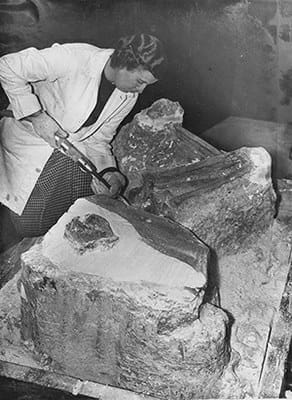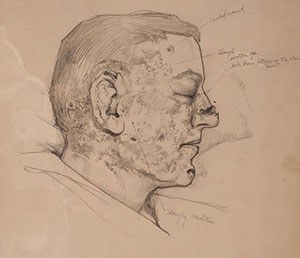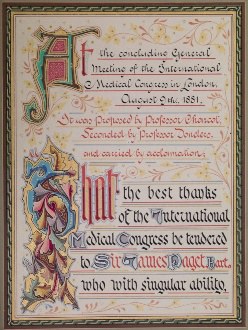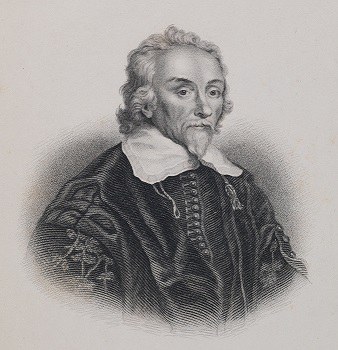Previous Displays
The College in Print
 Currently on display on the ground floor of the College are facsimiles from the archives relating to the theme of ‘The College in Print’.
Currently on display on the ground floor of the College are facsimiles from the archives relating to the theme of ‘The College in Print’.
These explore depictions of the College in literature and magazines – and it’s not always complimentary.
Items on display include some beautiful 19th century drawings of fossilised wood; photographs of staff (some in some rather unusual poses!) and buildings; and some scathing, witty 19th critiques of the College from ‘the Lancet’.
War, Art and Surgery
 The display looks at how surgeons responded to the unprecedented challenge of treating injuries caused by new weaponry of the first fully mechanised war.
The display looks at how surgeons responded to the unprecedented challenge of treating injuries caused by new weaponry of the first fully mechanised war.
On show are a variety of photographs, vivid illustrations, and patient case notes, including some treated by Sir Harold Gillies, that highlight emergency surgery in the field, wounds of the First World War and reconstructive surgery.
Sir Percivall Pott and Sir James Paget
 To celebrate the 300th birthday of Sir Percival Pott (1714-1788) and the 200th birthday of Sir James Paget (1814-1899) we have selected some items from our Library and Archives collections for display in the Library.
To celebrate the 300th birthday of Sir Percival Pott (1714-1788) and the 200th birthday of Sir James Paget (1814-1899) we have selected some items from our Library and Archives collections for display in the Library.
Featuring lecture notes, diaries, letters, certificates and diagrams of surgical treatment, this display celebrates two pioneering surgeons and renowned surgical educators of the past.
Quacks and Cures
 This facsimile display looks at some of the less regulated medical treatments represented in our archives, from household ‘recipe’ books of cures for common ailments to suspected practices of ‘quackery’ targeted by the College and the wider orthodox medical community.
This facsimile display looks at some of the less regulated medical treatments represented in our archives, from household ‘recipe’ books of cures for common ailments to suspected practices of ‘quackery’ targeted by the College and the wider orthodox medical community.
